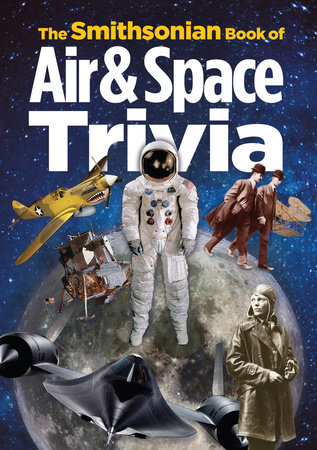SMITHSONIAN INSTITUTION is the largest museum complex in the world, and its National Air and Space Museum is one of the most popular sites in Washington, D.C., where its galleries showcase the spectrum of flying machines from the 1903 Wright Flyer to SpaceShipOne. The museum's Stephen F. Udvar-Hazy Center in Chantilly, VA, is the most visited tourist attraction in the state. AMY PASTAN is a Washington, DC-based author, editor, and photo researcher. A former staff editor at the Smithsonian Institution, she currently writes and produces books for both adults and children. Among her recent titles is
The Smithsonian Book of Presidential Trivia.
PUBLISHERS WEEKLY
A perfect gift for the space geek in one's life, this brief but packed collection will offer surprises even to those knowledgeable about early aircraft and space travel. Obscure factoids abound; for instance, the toy Buzz Lightyear really did fly—he was taken on a 2008 Space Shuttle Discovery mission to the International Space Station. Topics range from the Apollo space missions to pioneer figures in aviation like the Wright Brothers, and the book tests knowledge of such details as the names of all the space shuttles as well as the first military airplane and first money-making passenger plane. The information on women in aviation is extensive, including the fact that the first air attendant originally applied to be a pilot. And, of course, the Smithsonian addresses the oft-asked question, "How do astronauts go to the bathroom in space?," complete with a picture of space diapers. With numerous photos, especially of various aircraft, this is something that should appeal to all ages and backgrounds. 115 b&w photos. (Apr.)
FOREWORD
The Smithsonian Book of Air & Space Trivia gives a bite-size overview of human flight from primitive attempts at aircraft to commercial jets, space in pop culture, and military aviation. The book’s Q&A format makes it easy to pick up for either a minute or an hour.
With each question is a bold, quick answer, then several paragraphs giving more detail, allowing the reader to choose between skimming for facts or seeking more in-depth learning. The chapters are organized around topics like “Pioneers of Air and Space,” “Launchings and Landings,” and “Controversies and Calamities.” Each chapter includes a quote (often from an aviator) that captures the theme. The book contains a mix of well-known facts (Q: Who invented the first powered, piloted, heavier-than-air machine to sustain controlled flight? A: The Wright brothers) to lesser-known details (Q: What space missions were “saved” using duct tape? A: Apollo 13 and 17). It touches on engineering, culture, and politics (like the space race during the Cold War). Chapters on combat in flight and women in aviation provide particularly interesting cultural and historical views.
The Smithsonian is the ultimate authoritative source, giving the book both credibility and excellence, both of which extend from the information itself to the editorial and design quality. Many pages contain images, mostly photos, that augment the information.
The book is perfect for teachers who want to hook their students’ interest, baby boomers who grew up in awe of space travel, kids and teens energized by trivia, and anyone who’s enthralled by the people and science behind humanity’s life in flight. It reads a bit like a friendly encyclopedia, and it’s a perfect diving-off point for further research.
The Smithsonian Book of Air & Space Trivia is a fun read for everyone who’s curious about all things airborne.
Melissa Wuske
SCHOOL LIBRARY JOURNALThe question-and-answer format of this title takes on a wide range of aeronautical topics that will appeal to browsers. Subject-related chapters, such as “Pioneers of Air and Space” and “Centuries of Discovery”, are informative and entertaining. There’s a wide range of content here. For instance, “Getting on Board” discusses commercial travel, while “Dogfights and Aliens” tackles science fiction, model planes, media heroes, paintings, movies, and toys. Pilots, astronauts, acrobatic champions, spacewalkers, commanders, scrunchies (to contain long hair in weightlessness), and the first flying First Lady (Florence Harding) are addressed in “Women Take Flight.” Relevant photographs amplify the text. The extensive subject coverage makes for engaging reading that will, nevertheless, be popular.–Frances E. Millhouser, formerly at Fairfax County Public Library, VA

















